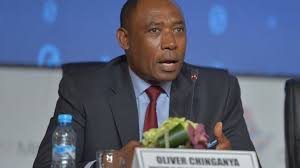Reliable data and statistics are necessary for informed decision-making if Africa is to achieve sustainable development, said Oliver Chinganya, the outgoing African Centre for Statistics Director, during his farewell remarks at the 9th Statistical Commission meeting in Addis Ababa, Ethiopia.
Mr. Chinganya underscored the critical role statisticians play in generating and delivering reliable data and statistics that meet present and future development needs.
Reflecting on his tenure at the helm of the African Centre for Statistics (ACS), Mr. Chinganya said he led the Centre at a critical juncture when reliable, accurate, and timely data increased in urgency as Africa faced numerous challenges ranging from high debt levels, climate change and food security to lack of better data to inform policy decisions.
“Our role was to ensure that national statistical systems were up to the task of providing reliable data necessary for informed decision-making, both for national governments and for global reporting, such as the Sustainable Development Goals,” said Mr. Chinganya whose career has seen him serve in various capacities at the International Monetary Fund, the World Bank, and the African Development Bank before joining the ECA.
At one point during his tenure at the ECA, Mr. Chinganya simultaneously headed the Technology, Climate Change and Natural Resources Division and the African Centre for Statistics, experiences he said made him more aware of the need for resilient data systems to address emerging global challenges.
Stressing that the ACS has amplified Africa’s voice in the global statistical community, Mr. Chinganya also emphasized the role of collaborations and partnerships in meeting global best practices and contributing to the international statistical agenda.
He noted that the statistical landscape has changed with the entry of many players and actors, not all of whom are statisticians.
“The new actors whom I call “data enthusiasts”, have the resources and capacity to produce data in real time and are not bothered about data validation processes,” he said lamenting that the ‘data enthusiasts’ were easily listened to by governments because of the way they presented data and provided quick fixes.
Lamenting the poor coordination among other producers of data and lack of investment in the data value chain by governments, he said there is a challenge of increased data demand which is not matched by current capacity and a rapid change of technology.
“The COVID-19 pandemic placed unprecedented strain on our systems, revealing gaps in our ability to collect timely and vital statistics during crises, ” he said, emphasizing that the challenge presented opportunities for creative approaches in measurements and reinforced the importance of investing in robust and resilient data infrastructures.
Calling for stronger leadership in National Statistical Offices, Mr. Chinganya urged leaders to continue investing in their teams and fostering regional cooperation.
“The data we produce is not just for today—it is the legacy we leave for future generations,” he urged, calling on international Development Partners to deepen engagement with African statistical systems.
I envision an African statistical community that is robust, innovative, and influential on the global stage. I see a continent where data drives development, informs policy, and empowers citizens. Achieving this vision will require continued commitment, collaboration, and the nurturing of new talent.
Highlighting that the statistical landscape has evolved rapidly with new technologies and methodologies, Mr. Chinganya said a visionary, adaptable Director of the ACS is needed who embraces technological advancements such as leveraging big data and artificial intelligence.
“I am confident that with the right leadership, the African Centre for Statistics will continue to thrive and make significant contributions to the development of our continent,” said Mr. Chinganya, paying tribute to the staff at the ACS, national statistical offices experts from ECA member states and Africa’s statistical elders.
WN/as/APA


